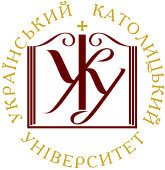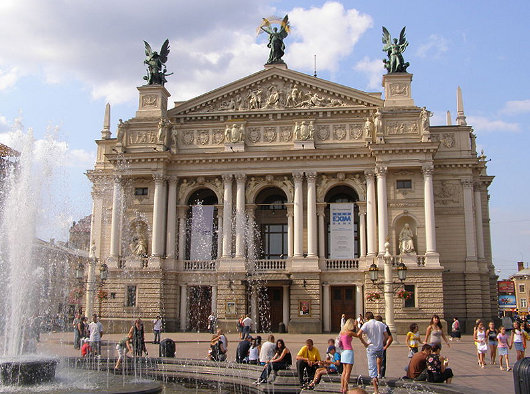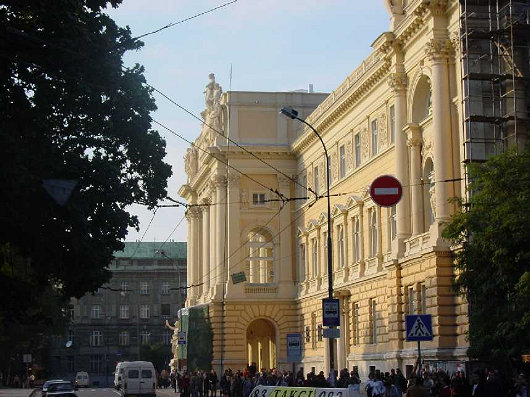
About Andrew Cusack
 Writer, web designer, etc.; born in New York; educated in Argentina, Scotland, and South Africa; now based in London.
Writer, web designer, etc.; born in New York; educated in Argentina, Scotland, and South Africa; now based in London. read more
News
Blogs
Reviews & Periodicals
Arts & Design
World
France
Mitteleuropa
Knickerbockers
Argentina
The Levant
Africa
Cape of Good Hope
Netherlands
Scandinavia
Québec
India
Muscovy
Germany
Academica
Universitas Catholica Ucrainorum, Leopolis

Lviv — sometimes called Lemberg, Lwów, or Leopolis — sits in one of those corners of Europe that has born tremendous witness to the unfolding of history over the centuries. It was founded in the fourth century, built by the Poles, besieged by the Turks, ceded to the Austrians, regained by the Poles, captured by the Nazis, subjugated by the Soviets, and finally freed under an independent Ukraine. Lviv is the capital of Carpathia… and Galicia… not to mention Ruthenia, and nobody can quite define the difference between those three places, while some even argue that one or another (or all) don’t actually exist. For now, we can say with authority that Lviv is the most prominent city in the western Ukraine, and has for centuries been an important place of Catholic culture.
As Damian Thompson points out, Lviv is now home to the Ukrainian Catholic University (Український Католицький Університет). “You must look into this place,” Edward Lucas of the Economist told Damian Thompson: “It’s quite amazing.”
 “This wonderful institution,” Mr. Thompson writes, “offers a philosophy of teaching in radical contrast to the moribund model of Catholic further education found in this country and much of the West. … Run on a shoestring, [the Ukrainian Catholic University] teaches not only the liberal arts and trains Eastern-rite Catholic priests, but also places a community of mentally- and physically-handicapped people at the centre of its spiritual and social life. Now that is what I call a Catholic ethos.”
“This wonderful institution,” Mr. Thompson writes, “offers a philosophy of teaching in radical contrast to the moribund model of Catholic further education found in this country and much of the West. … Run on a shoestring, [the Ukrainian Catholic University] teaches not only the liberal arts and trains Eastern-rite Catholic priests, but also places a community of mentally- and physically-handicapped people at the centre of its spiritual and social life. Now that is what I call a Catholic ethos.”
[The community of handicapped is run in association with L’Arche, which was founded by Jean Vanier. Monsieur Vanier is the son of Gen. Georges Vanier, the Canadian governor-general whose cause for sainthood is proceeding. I had the immense privilege of praying at Gen. Vanier’s tomb when I was last in Québec.]

The Opera House in Lviv, Galicia.
The University offers what Fr Boris Gudziak, the rector, describes as a holistic education. “It couldn’t be further,” Thompson continues, “from the wet nonsense dressed up as Catholicism in English colleges where the chapel is given over to a celebration of Mohammed’s birthday. That outrage happened at Newman University College, Birmingham; but if you want a glimpse of how Cardinal Newman’s ‘idea of a university’ might have translated into 21st-century terms, then you should look to Lviv, not Birmingham.”
“You might say: why can’t you sing the praises of the UCU without your ritual abuse of England’s Catholic trendies? The situations of the Church in this country and Ukraine are very different.”
“True. But the UCU’s ethos is Catholic, not Ukrainian, whereas the ethos of the UK’s Catholic institutions is heavily influenced by public-sector dogma and can only really be described as Catholic-lite.”
“Incidentally, why don’t we have a Catholic university? Perhaps we should ask Fr Gudziak how to start one.”
Indeed, why doesn’t Great Britain have a Catholic university? There have been numerous attempts. First was Cardinal Manning’s Catholic University College in Kensington, which was beset by mismanagement and financial scandal and eventually scuppered. Prior Park in Bath was originally supposed to be the foundation of a Catholic university but settled into being a boarding school. Most significant was Cardinal Newman’s Catholic University of Ireland in Dublin (remember, Ireland as much a part of the United Kingdom at the time as Scotland or Wales is today), but that eventually failed and was turned into University College Dublin (of the National University of Ireland). Tertiary studies for British Catholics nonetheless existed on a collegiate level at Stonyhurst, Ushaw, and Ware — the first and third now purely institutions of secondary education. (Allen Hall of St. Cuthbert’s College, Ware continues in London as the diocesan seminary of Westminster).
There were a number of efforts to create a Catholic college at Oxford, which failed variously due to the suspicions of the hierarchy, the hostility of the (Anglican) university, and the social whims of well-to-do Catholics. There are, at Oxford, a number of “permanent private halls” or PPHs, two of which are Catholic (Blackfriars and Campion Hall, Dominican & Jesuit respectively). A third, Greyfriars, was first founded in 1224, refounded in 1910, and just recently shut in 2008. St. Bede’s Hall, however, has just been founded as an independent Catholic college aimed at housing and teaching study-abroad students of the University of Oxford. [ERROR: I forgot to mention St. Benet’s Hall, a Benedictine PPH at Oxford.]
I have long pondered the possibilities of planting Catholic universities in London, Edinburgh, York, Canterbury, or elsewhere. The unfortunate problem is that most cities that would be conducive to hosting a university already have one (or two or three). Growth is responsibly managed in a very tight manner in our older cities, and purchasing the necessary property could be expensive and adapting old buildings as well as constructing new ones could be a bit pricey. We in the West sometimes tend to think of the ancillary aspects of a university — its gothic halls, well-kept lawns, and ample athletic fields — before we think of the ultimately more central aspect of teaching facilities. Perhaps the Ukrainian Catholic University has shown the way in operating on a shoestring and ensuring every penny donated by the faithful is well-spent, while waiting for the future to provide the not-quite-necessaries.

Previously: Lwów (Chemins de Fer de l’État Polonais)
Search
Instagram: @andcusack
Click here for my Instagram photos.Most Recent Posts
- Silver Jubilee November 21, 2024
- Articles of Note: 11 November 2024 November 11, 2024
- Why do you read? November 5, 2024
- India November 4, 2024
- The Lithe Efficiency of the Old Constitution November 4, 2024
Most Recent Comments
Book Wishlist
Monthly Archives
Categories



Most interesting post. I like that photo of the Opera House, and the woman standing in the fountain. Perhaps the Beatles were right when they sang, “the Ukraine girls really knock me out, and leave the West behind…”!
Although I wish the university well, I find myself much more interested in the buildings shown. By the view of the city as a whole, of course, but more particularly by the two delightful monuments to that most regretted of civilizations – that of the Habsburg Empire in the 19th Century.
1815 -1914. Did mankind every know a sweeter time?
There are currently three Catholic Permanent Private Halls at Oxford. You have missed out the Benedictine St. Benet’s Hall.
See:
http://www.st-benets.ox.ac.uk
http://en.wikipedia.org/wiki/St_Benet's_Hall,_Oxford
Of course Carpathia exists! Laurence Olivier was Prince Regent of it at one point.
So amusink how you vill laugh.
My pal Mike Mollet (ND 93) did the fundraising for the Ukrainian Catholic University within Chicago’s large Ukrainian community. I recall it being very hard work, but able to proceed with leaps and bounds.
JBP
Sorry to be pedantic, the name is St Edmund’s College, Old Hall Green, Ware and not St Cuthbert’s. Allen Hall Seminary moved from Old Hall to the centre of London.The College continues as a modern Catholic school, with its roots in the recusant tradition. It flourishes with a prep school and a senior school (11-18), with boy and girl students,both boarding and day.
Немного провакационный пост. Поэтому такие и комменты :)
Another point of correction: according to historical evidence, Lviv was founded in 1256 by King Danylo Halych in honor of his son, Lev.